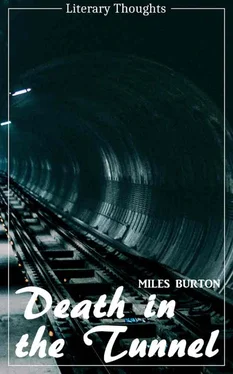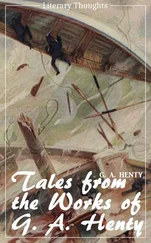Arnold did so, without discovering anything that could throw light upon Sir Wilfred’s death. Half a dozen letters upon indifferent subjects, as many appeals for subscriptions to various charities. Nor were the carbon copies of the letters dictated by Sir Wilfred on the previous day any more informative.
There was a large filing-cabinet in the room, and Arnold pointed to this. “What’s in there?” he asked.
Torrance shook his head. “I don’t know,” he replied. “It’s locked, and Sir Wilfred is the only person who had a key to it. I have an idea that he used to put his personal letters in it.”
The front of the cabinet was closed by a sliding shutter, fitted with a lock. In order to demonstrate his words, Torrance went up to it, and tried to raise the shutter. “Well, I’m damned!” he exclaimed. “It isn’t locked, after all! That’s the most extraordinary thing. There certainly must have been something on Sir Wilfred’s mind yesterday. I’ve never before known him to leave this cabinet unlocked.”
“Well, we may as well see what’s inside it,” said Arnold. Their search revealed nothing but a mass of correspondence, all carefully filed. As in the case of the other letters, there was nothing in there which could be considered in any way out of the ordinary. But, as Arnold drew out one of the documents, he heard something rattling. He removed the files it contained, and beneath them found half a dozen small metal objects. They were pistol cartridges, exactly similar in appearance to those which had been found in the magazine of the automatic.
Arnold picked them out of the drawer, and laid them on the table. “Can you account for these, Mr. Torrance?” he asked.
Torrance shook his head. “No, I can’t,” he replied. “They have probably been there a long time. Years ago, when I first knew him, Sir Wilfred was very fond of target shooting, and was a very good shot, both with rifle and revolver. But recently, I believe, he had given it up. I expect these are the remains of some cartridges which he used to keep here.”
Arnold made no comment upon this. He put the cartridges in his pocket, and helped Torrance to replace the correspondence in the drawer. “By the way,” he remarked, while they were thus engaged, “has your firm got any connections in Belgium?”
“Belgium?” Torrance replied. “We’ve got connections all over the world, and in Belgium, among other countries.”
“I am told that Sir Wilfred paid a visit to Belgium last summer. Was this on a matter of business?”
“Not to my knowledge. Sir Wilfred liked spending a few days abroad, from time to time. He may have called upon one or two people in Brussels and Antwerp with whom we do business, but only in a friendly way.”
“When do you expect Richard Saxonby?”
“We had a cable from him to-day, saying that he would arrive at Southampton on the 23rd. I presume that Miss Olivia had informed him of Sir Wilfred’s death.”
Arnold had no further inquiries to make, and he returned to Scotland Yard.
Desmond Merrion happened to be staying for a few days in London, at his rooms in St. James’s. He was something of an amateur criminologist, and a friend of Arnold’s. So, when he received a telephone call from the Inspector, suggesting that they should dine together that Friday evening, he guessed that Arnold was engaged upon some case which presented points of interest.
But he was rather surprised when he heard that Arnold had been engaged upon investigating the death of Sir Wilfred Saxonby. “I’ve read what the papers have to say,” he said. “And, to all appearances, it seemed a pretty obvious case of suicide. I’m astonished that the Yard should have been called in at all. The importance of Sir Wilfred’s position accounts for it, I suppose?”
“That’s about it,” Arnold replied. “I don’t think there’s much room for doubt that Sir Wilfred shot himself. But the papers don’t know quite as much as I do. I’d like to tell you what I’ve heard, and see what you make of it.”
He described his investigations in detail. “Now, it strikes me that Sir Wilfred planned his suicide some time in advance,” he continued. “He decided that he would shoot himself. He already possessed a revolver, but that was too cumbrous and noisy a weapon for his purpose. A small automatic would be just as deadly, and much more convenient.
“But how was he to get hold of one? As you know, automatic pistols cannot be bought in this country without the production of a firearms certificate. Certainly a man in Sir Wilfred’s position would not have had the slightest difficulty in obtaining such a certificate. But secrecy is a characteristic of the intending suicide. Sir Wilfred would imagine that people would wonder what he wanted an automatic for, and would be afraid that they would guess correctly. It would suit him far better to get hold of one without the necessity of applying for a certificate.
“This would be the simplest thing in the world. He had only to go abroad, buy a pistol while there, and smuggle it in. He was probably known to the customs officers at the port where he landed, and they would not make any very extensive search of his baggage. Besides, a little pistol like that could easily be concealed about the person, and with it a dozen rounds of ammunition.”
“You haven’t yet traced the purchase of the pistol, have you?” Merrion asked.
“No, but with the help of a firearms expert, I hope to.”
“You’re probably on the right track. I have only one comment to make. I can’t imagine, somehow, that Saxonby bought the pistol for the sole purpose of killing himself with it. Why should he have his initials engraved upon it, if so?”
“I’ve got an idea about that. I told you, I think, that none of the other firearms at Mavis Court have initials on them. I believe that Sir Wilfred had them engraved upon the automatic for a definite purpose. He wanted it to be quite clear that the pistol was his, to prevent suspicion falling upon anybody else. Suicides do that kind of thing, you know.”
“Such as leaving letters behind them, explaining their actions. All right, go ahead.”
“Having provided himself with the weapon, Sir Wilfred’s next move was to get his family out of the way. I imagine that he hated the idea of any fuss or bother. He would like to be buried and out of the way before his sorrowing relatives could make a scene. At all events, he suggested that his son and his wife should go to America, and his daughter and her husband to the South of France. That, I think, is an indication of what was in his mind.”
“Very possibly,” Merrion replied. “So far as you know, he took no steps to get his niece out of the way?”
“Apparently not. But perhaps he knew that she would not come into the category of a sorrowing relative. From what I saw and heard, I don’t think that Miss Olivia is likely to break her heart over her uncle’s death. Sir Wilfred’s next step was to decide upon the time and place of his suicide. His dislike of fuss would prevent him from shooting himself either at his office or at Mavis Court. Too many people about. They would rush in at the sound of the shot, and possibly disturb his last moments. He knew the line between London and Stourford well enough, and must have noticed how suitable Blackdown Tunnel was to his purpose. If he could get a carriage to himself, he could fire the shot as the train was passing through the tunnel, and it would be very unlikely that his death would be discovered until it reached Stourford.”
“And that, you think, is what actually happened?”
“I’m willing to bet that it is what the coroner and his jury will think. After all, if you find a man dead in a locked railway carriage, with the weapon which killed him within a couple of feet or so, the suggestion of suicide is bound to be pretty strong.
Читать дальше












